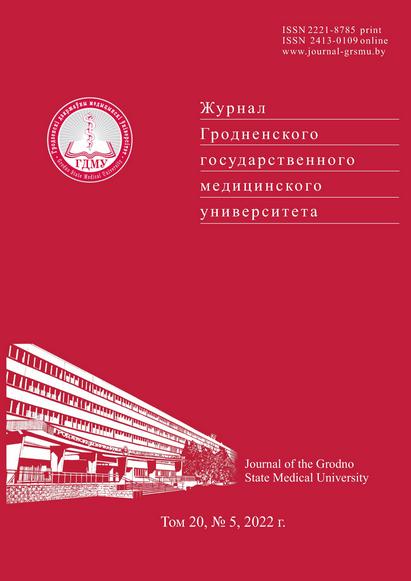ГЕНЕТИЧЕСКИЕ ПРЕДИКТОРЫ РАЗВИТИЯ ОСТРОГО ПОЧЕЧНОГО ПОВРЕЖДЕНИЯ

Аннотация
Острое почечное повреждение (ОПП) – распространенная патология с высоким риском летального исхода. Проблема диагностики усугубляется тем, что на данный момент отсутствует специфический метод диагностики ОПП, а основным методом лечения остается почечно-заместительная терапия. Генетическое типирование позволяет по-новому взглянуть на проблему, способствует развитию индивидуального подхода к каждому пациенту, облегчая выявление заболевания на начальных стадиях. Выявление и изучение генетических маркеров, специфичных для ОПП, позволит сформировать новые подходы к профилактике и лечению почечной патологии. В статье приведены данные существующих исследований по рассматриваемой теме. Правомерен вывод о том, что проблема многогранна и требует дальнейшего изучения.
Литература
Ronco C, Bellomo R, Kellum JA. Acute kidney injury. Lancet. 2019;394(10212):1949-1964. https://doi.org/10.1016/S0140-6736(19)32563-2.
Uchino S, Kellum JA, Bellomo R, Doig GS, Morimatsu H, Morgera S, Schetz M, Tan I, Bouman C, Macedo E, Gibney N, Tolwani A, Ronco C. Acute renal failure in critically ill patients: a multinational, multicenter study. JAMA. 2005;294(7):813-818. https://doi.org/10.1001/jama.294.7.813.
Bagshaw SM, Uchino S, Bellomo R, Morimatsu H, Morgera S, Schetz M, Tan I, Bouman C, Macedo E, Gibney N, Tolwani A, Oudemans-van Straaten HM, Ronco C, Kellum JA. Septic acute kidney injury in critically ill patients: clinical characteristics and outcomes. Clin J Am Soc Nephrol. 2007;2(3):431-439. https://doi.org/10.2215/CJN.03681106.
Kidney Disease: Improving Global Outcomes (KDIGO) Acute Kidney Injury Work Group. KDIGO Clinical Practice Guideline for Acute Kidney Injury. Kidney Inter Suppl. 2012;2(1):1-138. https://doi.org/10.1038/kisup.2012.1.
Rej SI, Berdnikov GA, Vasina NV. Ostroe pochechnoe povrezhdenie 2020: jepidemiologija, kriterii diagnostiki, pokazanija, sroki nachala i modal’nost’ zamestitel’noj pochechnoj terapii [Acute kidney injury in 2020: epidemiology, diagnostic criteria, indications, timing and modality of renal replacement therapy]. Anesteziologija i reanimatologija [Russian Journal of Anaesthesiology and Reanimatology]. 2020;5:63-69. https://doi.org/10.17116/anaesthesiology202005163. (https://www.elibrary.ru/thkxvs. Russian).
Kinsey GR, Li L, Okusa MD. Inflammation in acute kidney injury. Nephron Exp Nephrol. 2008;109(4):e102-107. https://doi.org/10.1159/000142934.
Wen X, Murugan R, Peng Z, Kellum JA. Pathophysiology of acute kidney injury: a new perspective. Contrib Nephrol. 2010;165:39-45. https://doi.org/10.1159/000313743.
Jaber BL, Liangos O, Pereira BJ, Balakrishnan VS. Polymorphism of immunomodulatory cytokine genes: implications in acute renal failure. Blood Purif. 2004;22(1):101-111. https://doi.org/10.1159/000074930.
Su H, Lei CT, Zhang C. Interleukin-6 Signaling Pathway and Its Role in Kidney Disease: An Update. Front Immunol.2017;8:405. https://doi.org/10.3389/fimmu.2017.00405.
Dalboni MA, Quinto BM, Grabulosa CC, Narciso R, Monte JC, Durão M Jr, Rizzo L, Cendoroglo M, Santos OP, Batista MC. Tumour necrosis factor-α plus interleukin-10 low producer phenotype predicts acute kidney injury and death in intensive care unit patients. Clin Exp Immunol.2013;173(2):242-249. https://doi.org/10.1111/cei.12100.
Nechemia-Arbely Y, Barkan D, Pizov G, Shriki A, RoseJohn S, Galun E, Axelrod JH. IL-6/IL-6R axis plays a critical role in acute kidney injury. JASN. 2008;19(6):1106-1115. https://doi.org/10.1681/ASN.2007070744.
Gaudino M, Di Castelnuovo A, Zamparelli R, Andreotti F, Burzotta F, Iacoviello L, Glieca F, Alessandrini F, Nasso G, Donati MB, Maseri A, Schiavello R, Possati G. Genetic control of postoperative systemic inflammatory reaction and pulmonary and renal complications after coronary artery surgery. J Thorac Cardiovasc Surg. 2003;126(4):1107-1112. https://doi.org/10.1016/s0022-5223(03)00396-9.
Stafford-Smith M, Podgoreanu M, Swaminathan M, Phillips-Bute B, Mathew JP, Hauser EH, Winn MP, Milano C, Nielsen DM, Smith M, Morris R, Newman MF, Schwinn DA. Association of genetic polymorphisms with risk of renal injury after coronary bypass graft surgery. Am J Kidney Dis. 2005;45(3):519-530. https://doi.org/10.1053/j.ajkd.2004.11.021.
Payen D, Lukaszewicz AC, Legrand M, Gayat E, Faivre V, Megarbane B, Azoulay E, Fieux F, Charron D, Loiseau P, Busson M. A multicentre study of acute kidney injury in severe sepsis and septic shock: association with inflammatory phenotype and HLA genotype. PLoS One. 2012;7(6):e35838. https://doi.org/10.1371/journal.pone.0035838.
Hashad DI, Elsayed ET, Helmy TA, Elawady SM. Study of the role of tumor necrosis factor-alpha (-308 G/A) and interleukin-10 (-1082 G/A) polymorphisms as potential risk factors to acute kidney injury in patients with severe sepsis using high-resolution melting curve analysis. Ren Fail. 2017;39(1):77-82. https://doi.org/10.1080/0886022X.2016.1244081.
Mu H, Zheng Q, Hao L. IL-10-1082 A/G polymorphism is related with the risk and clinical characteristics of acute kidney injury: a case-control study. BMC Nephrol. 2021;22(1):212. https://doi.org/10.1186/s12882-021-02410-1.
Susantitaphong P, Perianayagam MC, Tighiouart H, Liangos O, Bonventre JV, Jaber BL. Tumor necrosis factor alpha promoter polymorphism and severity of acute kidney injury. Nephron Clin Pract. 2013;123(1-2):67-73. https://doi.org/10.1159/000351684.
Roedder S, Kimura N, Okamura H, Hsieh SC, Gong Y, Sarwal MM. Significance and suppression of redundant IL17 responses in acute allograft rejection by bioinformatics based drug repositioning of fenofibrate. PLoS One. 2013;8(2):e56657. https://doi.org/10.1371/journal.pone.0056657.
Grabulosa CC, Batista MC, Cendoroglo M, Quinto BM, Narciso R, Monte JC, Durão M, Rizzo LV, Santos OF, Dalboni MA. Frequency of TGF- β and IFN- γ genotype as risk factors for acute kidney injury and death in intensive care unit patients. Biomed Res Int. 2014;2014:904730. https://doi.org/10.1155/2014/904730.
He J, Xie G, Wu H, Xu S, Xie J, Chen Y, Zhao X. Association between inflammatory-response gene polymorphisms and risk of acute kidney injury in children. Biosci Rep. 2018;38(6):BSR20180537. https://doi.org/10.1042/BSR20180537.
Lin X, Yuan J, Zhao Y, Zha Y. Urine interleukin-18 in prediction of acute kidney injury: a systemic review and meta-analysis. J Nephrol. 2015;28(1):7-16. https://doi.org/10.1007/s40620-014-0113-9.
Ortega-Loubon C, Martínez-Paz P, García-Morán E, Tamayo-Velasco Á, López-Hernández FJ, Jorge-Monjas P, Tamayo E. Genetic Susceptibility to Acute Kidney Injury. J Clin Med. 2021;10(14):3039. https://doi.org/10.3390/jcm10143039.
Bates DO. Vascular endothelial growth factors and vascular permeability. Cardiovasc Res. 2010;87(2):262-271. https://doi.org/10.1093/cvr/cvq105.
Cardinal-Fernández P, Ferruelo A, El-Assar M, Santiago C, Gómez-Gallego F, Martín-Pellicer A, Frutos-Vivar F, Peñuelas O, Nin N, Esteban A, Lorente JA. Genetic predisposition to acute kidney injury induced by severe sepsis. J Crit Care. 2013;28(4):365-370. https://doi.org/10.1016/j.jcrc.2012.11.010.
Stafford-Smith M, Podgoreanu M, Swaminathan M, Phillips-Bute B, Mathew JP, Hauser EH, Winn MP, Milano C, Nielsen DM, Smith M, Morris R, Newman MF, Schwinn DA. Association of genetic polymorphisms with risk of renal injury after coronary bypass graft surgery. Am J Kidney Dis. 2005;45(3):519-530. https://doi.org/10.1053/j.ajkd.2004.11.021.
Isbir SC, Tekeli A, Ergen A, Yilmaz H, Ak K, Civelek A, Zeybek U, Arsan S. Genetic polymorphisms contribute to acute kidney injury after coronary artery bypass grafting. Heart Surg Forum. 2007;10(6):E439-444. https://doi.org/10.1532/HSF98.20071117.
Susantitaphong P, Perianayagam MC, Kang SW, Zhang W, Rao F, O’Connor DT, Jaber BL. Association of functional kallikrein-1 promoter polymorphisms and acute kidney injury: a case-control and longitudinal cohort study. Nephron Clin Pract. 2012;122(3-4):107-113. https://doi.org/10.1159/000350733.
Makarevich PI, Andreenko EJu, Balackij AV, Kolotvin AV, Popova NO, Jarovaja EB, Samohodskaja LM, Tkachuk VA. Kombinacii allelej genov NOS3 i CYBA i risk razvitija jessencial’noj arterial’noj gipertonii u muzhchin [Combinations of NOS3 and CYBA alleles and essential hypertension risk in men] Kardiovaskuljarnaja terapija i profilaktika [Cardiovascular Therapy and Prevention]. 2010;9(3):4-9. edn: LPAPHB. (Russian).
Perianayagam MC, Tighiouart H, Nievergelt CM, O’Connor DT, Liangos O, Jaber BL. CYBA Gene Polymorphisms and Adverse Outcomes in Acute Kidney Injury: A Prospective Cohort Study. Nephron Extra. 2011;1(1):112-123. https://doi.org/10.1159/000333017.
Perianayagam MC, Liangos O, Kolyada AY, Wald R, MacKinnon RW, Li L, Rao M, Balakrishnan VS, Bonventre JV, Pereira BJ, Jaber BL. NADPH oxidase p22phox and catalase gene variants are associated with biomarkers of oxidative stress and adverse outcomes in acute renal failure. J Am Soc Nephrol. 2007;18(1):255-263. https://doi.org/10.1681/ASN.2006070806.
Haase-Fielitz A, Haase M, Bellomo R, Lambert G, Matalanis G, Story D, Doolan L, Buxton B, Gutteridge G, Luft FC, Schunck WH, Dragun D. Decreased catecholamine degradation associates with shock and kidney injury after cardiac surgery. J Am Soc Nephrol. 2009;20(6):1393-1403. https://doi.org/10.1681/ASN.2008080915.
Kornek M, Deutsch MA, Eichhorn S, Lahm H, Wagenpfeil S, Krane M, Lange R, Boehm J. COMT-Val158Metpolymorphism is not a risk factor for acute kidney injury after cardiac surgery. Dis Markers. 2013;35(2):129-134. https://doi.org/10.1155/2013/279046.
Alam A, O’Connor DT, Perianayagam MC, Kolyada AY, Chen Y, Rao F, Mahata M, Mahata S, Liangos O, Jaber BL. Phenylethanolamine N-methyltransferase gene polymorphisms and adverse outcomes in acute kidney injury. Nephron Clin Pract. 2010;114(4):253-259. https://doi.org/10.1159/000276577.






























